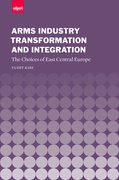June 2014: European energy security, world nuclear forces data, peacebuilding in Mali and more
 |
 |
 |
 |
 |
| SIPRI Update: Global Security & Arms Control |
|
|
|
Nuclear power and European energy security
Momentum is building for a common approach to energy within the European Union (EU). However, the wide spectrum of views about the role of nuclear power within the overall EU energy approach means that it remains a contested issue, write Vitaly Fedchenko and Ian Anthony.
Continue reading ... |
 |
SIPRI launches nuclear forces data
On 16 June SIPRI released its data on world nuclear forces in 2014, which shows that while the overall number of nuclear weapons in the world continues to decline, none of the nuclear weapon-possessing states are prepared to give up their nuclear arsenals in the foreseeable future.
Continue reading ... |
 |
The case for ‘track III’ interventions in Mali
Most peacebuilding efforts in Mali concentrate on the Malian Government and the various rebel groups. However, initiatives carried out by local communities and other non-state actors can also create a conducive environment for the settling of the conflict, argues Gaudence Nyirabikali.
Continue reading ... |
 |
China’s protection of its overseas interests
The evacuation of over 3500 Chinese citizens from Viet Nam in May 2014 following anti-China protests demonstrated once again that, for China, protecting its overseas interests is becoming an increasingly complex challenge, write Mathieu Duchâtel, Oliver Bräuner and Zhou Hang.
Continue reading ... |
 |
| STAFF NEWS |
 |
SIPRI announces Director for interim period
On 2 June 2014 the SIPRI Governing Board appointed Dr Ian Anthony as SIPRI Director for an interim period. Dr Anthony will maintain his position as Director of SIPRI's European Security Programme.
Dr Anthony is a widely known and respected expert on issues related to international security, arms control and disarmament. His numerous publications include Africa and the Global Market in Natural Uranium: From Proliferation Risk to Non-proliferation Opportunity, SIPRI Policy Paper no. 39 (2013, co-author), Reforming Nuclear Export Controls: The Future of the Nuclear Suppliers Group, SIPRI Research Report no. 22 (2007, co-author), and ‘Measures to combat nuclear terrorism’ published in SIPRI Yearbook 2013.
He can be contacted via email at director@sipri.org.
|
| FEATURED PUBLICATION |
 |
Protecting China’s Overseas Interests: The Slow Shift away from Non-interference
by Mathieu Duchâtel, Oliver Bräuner and Zhou Hang
Non-interference is one of the Five Principles of Peaceful Coexistence that is core to China’s foreign policy and to its self-image. But in a pragmatic and incremental adaptation to its globalizing economic and security interests, Chinese foreign policy is slowly shifting away from a strict interpretation of this principle. However, the debate on China’s overseas interests and noninterference is far from over. There is still a degree of uncertainty regarding whether China will continue on the path of pragmatic adaptation within the non-interference framework, and the degree of change in concrete policy outcomes that such an evolution would entail.
The authors show that the possibility of a dramatic policy change cannot be ruled out, as dramatic and unforeseen events could precipitate change. China’s foreign policy could also strictly remain within the boundaries of non-interference. Its ultimate strategic choice will certainly have far-reaching effects on global governance and international security.
Download the SIPRI Policy Paper ... |

|
| NEW PUBLICATION |
 |
Arms Industry Transformation and Integration:
The Choices of Central Europe
by Yudit Kiss
Special offer: to receive a 30 per cent discount on this book, use the code AAFLY6 when you order online from Oxford University Press.
The defence industry was one of the pillars of the command economy system in East Central Europe. After the end of the cold war the sector went through dramatic changes: it was radically downsized, reorganized and restructured according to the needs of the emerging new socio-economic systems. One of the major factors that shaped this adjustment was the enlargement of NATO and the European Union and the prospect of integration into these two organizations.
This book presents a comparative analysis of the defence industries of six East Central European countries—Bulgaria, the Czech Republic, Hungary, Poland, Romania and Slovakia—describing how they adjusted to the changed political and economic environment in both the domestic and international contexts.
Read more about this book ... |

|
© SIPRI 2014. ISSN 1654-8264.
Contact SIPRI by email: sipri@sipri.org; telephone: +46 8 655 97 00; or post:
SIPRI, Signalistgatan 9, SE-169 70 Solna, Sweden. Visit us online at www.sipri.org.
This message was sent to [agnEMAIL]. If you would prefer not to receive emails from SIPRI simply unsubscribe.
|
|








